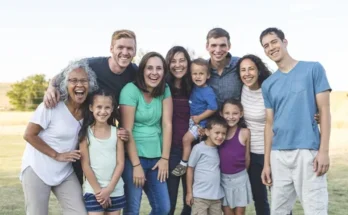The Timeless Importance of Family:
In a world that is constantly shifting and evolving, the concept of family remains one of the few constants we can rely on. Family is not just about genetics or tradition. It is the emotional ecosystem we are born into, grow within, and often return to in times of need. Whether big or small, traditional or chosen, family serves as the root system from which our identities grow. This perspective aligns with the sociological idea of kinkeeping, where emotional labor—often performed silently—helps maintain and nurture extended family connections.
Family is where we learn our first lessons about love, trust, and responsibility. It is the space where we are most seen and most known, sometimes for better and sometimes for worse. Yet, in its purest form, family represents unconditional love and enduring support. It is both an anchor and wings.
Family in All Its Beautiful Forms:
Gone are the days when family fit into one rigid definition. Today, families are diverse and dynamic, reflecting the wide spectrum of human experience. While the traditional nuclear family still exists, so do blended families, single-parent homes, same-gender parents, extended households, foster families, and more.
-
The Rise of Chosen Families
Sometimes, blood is not what makes someone family. In many cases, friendships evolve into deeply supportive relationships that mirror the love and loyalty of a biological family. Professionals on LinkedIn have written about the emotional support and inclusive culture these chosen families foster especially in workplaces where individuals seek belonging and psychological safety. These chosen families are built through mutual respect, shared experiences, and unwavering presence during life’s highs and lows. They are proof that family is not always inherited. Sometimes, it is built one moment at a time.
-
Multigenerational Magic
In some cultures and communities, multigenerational living is the norm. Grandparents, parents, and children all under one roof create a special environment. Wisdom is passed down through stories. Traditions are preserved naturally. Children grow up with a deeper sense of heritage and belonging. These living arrangements are not always easy, but they offer a richness of experience that few others can match.
The Challenges Families Face Today:
While the idea of family is comforting, the reality of maintaining one can be complex. Every family goes through seasons of harmony and tension. Disagreements happen. Expectations clash. Circumstances shift. And in the middle of it all, the goal remains the same: to stay connected through change.
-
The Digital Dilemma
Technology has brought families closer in some ways but has also pulled them apart in others. Family dinners are sometimes overshadowed by glowing screens. Conversations turn into text exchanges. Togetherness is measured in proximity rather than presence. It takes conscious effort to put the devices down and engage in the kind of connection that builds memories and trust.
-
Distance and Separation
In our increasingly global world, many families are spread across countries and time zones. Careers, education, or life circumstances take us away from our roots. While video calls and messages help, nothing truly replaces the warmth of a hug or the comfort of sharing the same space. Distance tests the strength of bonds but can also deepen appreciation for the moments we do get together.
Traditions That Keep Families Grounded:
One of the ways families maintain their identity is through traditions. These can be big events or small rituals. Sunday dinners, holiday routines, bedtime stories, or even inside jokes that have lasted for years all serve as threads that stitch the fabric of family together.
-
The Power of Rituals
Rituals give structure to family life. They create expectations, offer comfort, and provide something to look forward to. Whether it is cooking a special meal every birthday or taking an annual trip to the same beach, these moments become part of the family’s story. They are the memories that are told and retold, gaining depth with each passing year.
-
Evolving Traditions
As families grow and change, so do their traditions. What once worked may no longer fit. New people join, others leave, and dynamics shift. The key is to adapt while holding onto the core of what matters: connection, celebration, and shared values. Flexibility allows families to stay close even when everything else is changing.
Emotional Foundations of a Strong Family:
While every family is unique, there are some emotional foundations that are common in strong, healthy families. These are not about being perfect. They are about being present, being honest, and being willing to grow together.
-
Communication and Openness
Being able to talk and truly listen is the heartbeat of any family. When children feel heard and parents feel respected, walls come down. Honest conversations, even when they are uncomfortable, are essential. It is through these exchanges that misunderstandings are cleared and deeper trust is built.
-
Forgiveness and Grace
No family is without mistakes. Words are said that should not have been. Actions are taken that hurt. But the ability to forgive and move forward is what keeps families whole. Forgiveness does not mean forgetting. It means choosing love over resentment and relationship over being right.
Parenting in a Modern World:
Parenting today looks very different from what it did a generation ago. The pressures are higher, the comparisons louder, and the expectations more complex. Yet, the essence remains: to raise children who feel loved, safe, and seen.
-
Nurturing with Intention
Intentional parenting means showing up fully for your child, not just being around them. It is about understanding their needs, being present in their world, and guiding them with patience rather than fear. It is not about having all the answers but being willing to grow and learn alongside them.
-
Balancing Authority with Affection
Discipline is part of parenting, but it works best when rooted in love. Children need boundaries, but they also need warmth. They thrive when they know they are accepted not for what they achieve but for who they are. Balancing firmness with affection is one of the greatest gifts a parent can offer.
Family as a Source of Identity:
Our family shapes the lens through which we see the world. It influences how we define love, how we handle conflict, and how we see ourselves. Even as we grow and form our own paths, the impact of family continues to echo.
-
Learning from the Past
Every family has stories. Some are joyful. Others are painful. But all of them hold lessons. Understanding where we come from helps us decide where we are going. It allows us to carry forward the good and break cycles that no longer serve us.
-
Building Legacy
Family is not just about the past. It is also about what we pass on. The values we teach. The stories we tell. The example we set. Every moment shared becomes part of a legacy that can inspire generations to come.
The Gift of Being There:
At the end of the day, the most powerful thing a family can offer is presence. Being there in the moments that matter. Celebrating victories. Sitting with pain. Laughing at the little things. That presence is what makes a house a home.
Family is not a fixed state. It is a living, breathing relationship that requires effort, care, and time. It is built not just through biology or law but through shared lives and open hearts.
Conclusion:
In a world of uncertainty, family remains a shelter. It is not always easy, but it is always worth it. Whether tied by blood or chosen through love, family offers us a place to return, a place to belong, and a place to grow.
So nurture it. Show up for it. Celebrate it. Because in the end, it is not what we have but who we have that truly matters.




